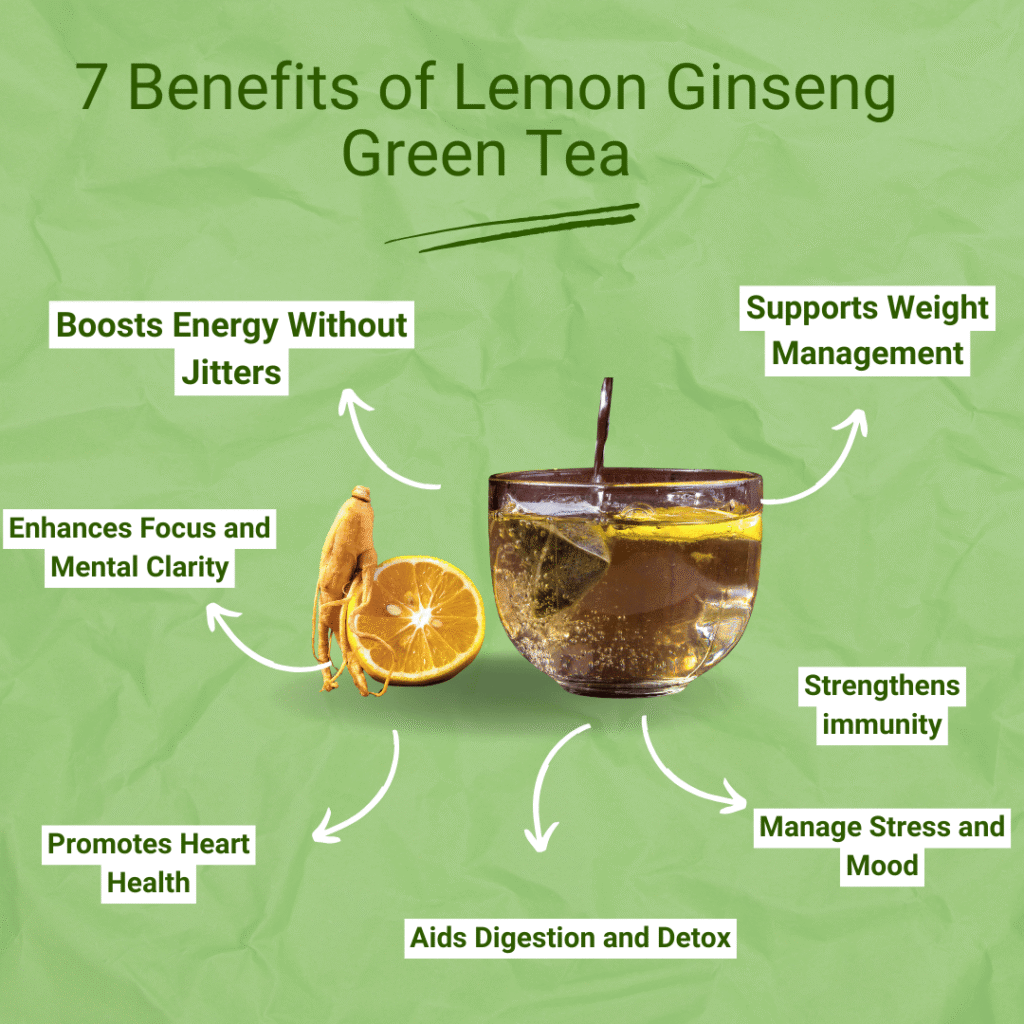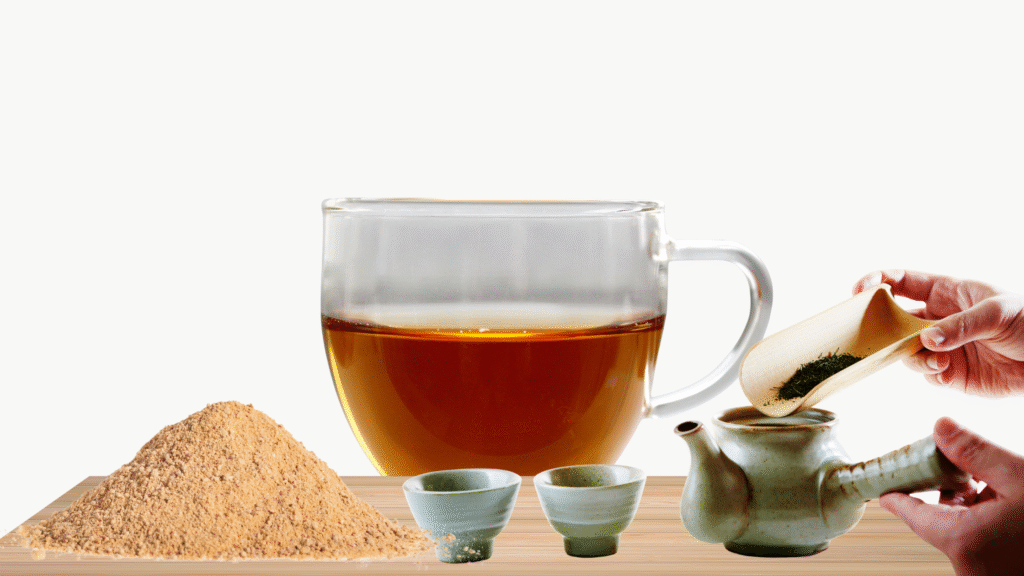Top 7 Benefits of Lemon Ginseng Green Tea for your health

Discover seven key benefits of lemon ginseng green tea for energy, weight loss, immunity, and focus. Perfect for tea lovers in the USA, UK, and India. In today’s health-focused world, tea lovers are constantly on the lookout for blends that not only taste great but also support overall wellness. Lemon ginseng green tea is one such fusion — a refreshing combination of three powerhouse ingredients: green tea, zesty lemon, and energizing ginseng. This herbal blend brings together the antioxidant strength of green tea, the cleansing effects of lemon, and the vitality-boosting benefits of ginseng into one soothing cup.
1. Introduction
Its popularity is quickly rising among tea drinkers in the USA, UK, and India, where people are turning to this functional beverage as a healthier alternative to sugary drinks, coffee, and synthetic energy boosters. Whether you’re trying to improve your metabolism, enhance your focus, or enjoy a detoxifying daily ritual, this tea delivers on its promise.
In this article, we’ll explore the top benefits of lemon ginseng green tea — from boosting energy without the jitters to supporting digestion, immunity, and weight loss. Let’s dive in and see why this drink deserves a place in your cup.
2. What Is Lemon Ginseng Green Tea?
Lemon ginseng green tea is a unique herbal infusion that blends three well-known ingredients — green tea, lemon, and ginseng — into one flavorful and health-boosting beverage. Each ingredient contributes its own set of benefits, making this tea a popular choice among health-conscious tea drinkers.
Key Ingredients:
- Green Tea: Rich in antioxidants like catechins, especially EGCG, known to support metabolism, heart health, and cognitive function.
- Lemon: Packed with vitamin C and citric acid, lemon adds detoxifying and immune-supporting properties.
- Ginseng: A traditional adaptogenic herb used for centuries to enhance energy, reduce stress, and support mental performance.
Natural Properties & Taste Profile
This tea offers a clean, invigorating flavor with layers of earthy green tea, tangy citrus from lemon, and a slightly sweet, peppery note from ginseng. It’s both calming and energizing, with a light body and refreshing aftertaste.
The combination makes it ideal for those who enjoy teas with a functional purpose, whether for a morning energy boost, an afternoon focus session, or a calming detox drink after meals.
Caffeine Content Overview
Green tea contains moderate caffeine levels, typically around 25–35 mg per cup, far less than coffee (which averages 95–100 mg). While lemon and ginseng are caffeine-free, ginseng enhances alertness naturally without overstimulating the body.
Result: A mild energy lift with reduced risk of jitters or caffeine crashes.
Available Forms:
You can enjoy lemon ginseng green tea in a variety of convenient formats:
- Tea Bags: Most common, great for on-the-go use
- Loose Leaf: Offers better quality and flavor control
- Bottled/Iced Tea: Found in health food stores or cafes (check for added sugars)
- DIY at Home: Brew green tea, add fresh lemon slices, and a few pieces of ginseng root or powder
Pro Tip: Homemade versions allow you to control strength, sweetness, and freshness.
3. Top 7 Benefits of Lemon Ginseng Green Tea
When combined, lemon, ginseng, and green tea create a synergistic wellness drink that supports both body and mind. Below are the seven most powerful and research-backed health benefits of lemon ginseng tea.

3.1 Boosts Energy Without Jitters
Unlike coffee, which can cause spikes and crashes in energy, green tea with ginseng offers a smoother, sustained energy boost. Ginseng enhances endurance and vitality, while green tea’s mild caffeine content and L-theanine promote alertness without overstimulation.
Why it’s better than coffee:
- No energy crash
- Supports calm focus, not nervousness
- Ideal for people sensitive to caffeine
3.2 Supports Weight Management
If you’re looking for an herbal tea to support weight loss, lemon ginseng green tea is a wise choice. Green tea is known to stimulate fat oxidation and metabolism. Lemon supports natural detoxification, while ginseng may help stabilize blood sugar and reduce food cravings.
How it helps:
- Boosts metabolic rate
- Enhances fat burning
- Reduces bloating and sugar cravings
3.3 Enhances Focus and Mental Clarity
The unique synergy of L-theanine (found in green tea) and ginseng promotes better mental performance, sustained concentration, and reduced mental fatigue, making this blend especially helpful for professionals, students, and creatives.
Best for:
- Staying focused without overstimulation
- Sharpening memory and reaction time
- Mental fatigue and brain fog
3.4 Strengthens Immunity
Packed with antioxidants and vitamin C, this tea is a strong ally for your immune system. Green tea provides catechins, lemon adds vitamin C, and ginseng contributes immune-enhancing properties that help the body resist infections and inflammation.
Immune-boosting highlights:
- Helps reduce inflammation
- Fights off free radicals
- Supports seasonal health and recovery
3.5 Promotes Heart Health
Green tea has been well-researched for its ability to lower blood pressure and LDL cholesterol, both key factors in the development of heart disease. Ginseng supports better blood circulation, and lemon keeps blood vessels flexible thanks to its vitamin C content.
Cardiovascular support includes:
- Improved circulation
- Healthy cholesterol levels
- Reduced blood pressure
3.6 Aids Digestion and Detox
The combination of lemon and green tea works naturally to support the liver and cleanse the digestive system. Ginseng adds anti-inflammatory properties that ease gut discomfort and reduce bloating. Together, they form a gentle, daily detox tea.
Great for:
- Morning detox routines
- Post-meal digestion
- Reducing gas and water retention
3.7 Helps Manage Stress and Mood
Ginseng is a powerful adaptogen, meaning it helps your body adapt to stress and restore balance. Paired with the calming effects of green tea’s L-theanine, this tea blend provides a gentle way to ease tension and support emotional wellness.
Benefits include:
- Reduced anxiety and stress levels
- Better mood and emotional balance
- Natural support for a busy lifestyle
4. Best Time to Drink Lemon Ginseng Green Tea
Time is significant in life, so the timing of your tea has an impact on its benefits. I show you how to use lemon ginseng green tea at different times of the day for maximum impact:
Morning:
It’s time to Jumpstart Your Metabolism and Energy. So start your day with a warm cup to awaken your body and mind. This mixture offers an energy boost and increases your alertness. Lemon supports detoxification and digestion, making it a great choice on an empty stomach or with breakfast.
Best for:
- Boosting metabolism
- Enhancing morning focus
- Supporting fat burning early in the day
Afternoon: Improve Focus and Productivity
Around midday, mental fatigue typically begins to set in. A second cup of lemon ginseng green tea can restore mental clarity and concentration. L-theanine and ginseng work together to sharpen focus without causing jitters, making them ideal for work or study sessions.
Best for:
- Fighting the post-lunch slump
- Staying productive and alert
- Supporting long work hours or creative tasks
Evening: Stress Relief with a Decaf Option
Green tea contains caffeine; you can switch to a decaf version or a herbal lemon-ginseng blend in the evening. This helps soothe the mind and body, reduce stress, and prepare you for restful sleep.
Best for:
- Managing evening stress
- Relaxing before bed
- Supporting a calming night routine
5. How to Make Lemon Ginseng Green Tea at Home
Making lemon ginseng green tea at home is easy, affordable, and allows you to control the strength, flavor, and freshness. Whether you prefer it hot or iced, this tea is a wellness ritual you can enjoy any time of day.
Simple Step-by-Step Recipe (Hot Version)

Pro Tip: Make a big batch and refrigerate it for up to 2 days. It’s a great alternative to sugary drinks or store-bought energy teas.
6. Are There Any Side Effects?
While lemon ginseng green tea is generally safe and beneficial for most people, it’s essential to be aware of potential side effects, especially if you have certain health conditions or are taking medication.
Who Should Avoid It?
- Pregnant or breastfeeding women should consult their doctor before consuming ginseng-based teas, as the effects on pregnancy and lactation are not well-studied.
- Children should avoid ginseng unless approved by a pediatrician.
- People with autoimmune disorders, heart conditions, or hormone-sensitive conditions should speak with a healthcare provider before adding ginseng to their diet.
Caffeine Sensitivity
Green tea naturally contains caffeine, typically ranging from 25 to 35 mg per cup. If you’re sensitive to caffeine, you might experience:
- Headaches
- Insomnia
- Rapid heartbeat
- Anxiety or restlessness
To avoid this, try decaf green tea or reduce your daily intake to one cup.
Interaction With Medications
Ginseng may interact with certain medications, including:
- Blood pressure or blood-thinning medications
- Diabetes medication (can lower blood sugar)
- Antidepressants or mood stabilizers
Always check with your healthcare provider if you’re taking prescription meds, especially if you plan to drink this tea daily. In most cases, lemon ginseng green tea is safe when consumed in moderation, around 1 to 2 cups per day for most adults.
7. Final Thoughts
I have explained the benefits of Lemon Ginseng Green Tea and how to make it. It is more than just a flavorful drink and wellness blend that delivers a variety of powerful benefits to the body. From boosting energy and focus to supporting weight loss, immunity, digestion, and stress relief, this tea truly earns its place in your daily routine. You should start this blend if you want to reduce or quit coffee and caffeine.
If you’re in the USA, UK, or India, tea lovers everywhere can enjoy this revitalizing blend for its natural ingredients, balanced flavor, and functional health benefits. You can brew it hot in the morning to start your day strong or enjoy it iced in the afternoon for a refreshing pick-me-up.
Ready to sip your way to better health? Give lemon ginseng green tea a try and feel the difference for yourself.
Do you have questions about how to prepare it, when to drink it, or how it compares to other teas? Drop your thoughts or questions in the comments below — I love to hear from you!
8. FAQs
Is lemon ginseng green tea good for weight loss?
Yes, it supports weight loss by boosting metabolism, aiding digestion, and helping reduce cravings, especially when paired with a healthy diet.
Does lemon ginseng green tea have caffeine?
Yes, it contains moderate caffeine from green tea (about 25–35 mg per cup), but far less than coffee. It provides energy without the jitters.
Can I drink it every day?
Yes, most people can safely enjoy 1–2 cups daily. If you’re sensitive to caffeine or on medications, consult your doctor first.
Is it good for the skin?
Absolutely. Its antioxidants help reduce inflammation, fight free radicals, and support clearer, healthier-looking skin.
Is ginseng tea stronger than regular green tea?
Ginseng tea is more stimulating and energizing, while green tea is milder. Lemon ginseng green tea combines the benefits of both for a balanced effect.
Is green tea good for weight loss?
Yes, green tea is widely known for supporting fat burning and metabolic rate due to its catechins and caffeine content.
What happens if I drink green tea with lemon every day?
Daily use may improve digestion, boost immunity, support weight loss, and provide detox benefits thanks to antioxidants and vitamin C.
Does green tea with lemon and ginseng break a fast?
If consumed without sugar, milk, or honey, it typically won’t break a fast and can even support fat burning during fasting periods.
Which tea burns the most fat?
Green tea (especially matcha), oolong, and pu-erh are top fat-burning teas. Lemon ginseng green tea is effective when used consistently.
How to reduce belly fat?
Pair healthy teas, such as green tea, with a balanced diet, regular exercise, and adequate sleep. No tea alone will reduce belly fat, but it helps.
What is the best time to drink ginseng tea?
The morning or early afternoon is ideal for maintaining energy and focus. Avoid late evening if you’re sensitive to stimulants.
What is the best time to drink green tea for weight loss?
Drink green tea 30 minutes before meals or in the morning to boost fat burning and reduce appetite.
Is ginseng tea good for skin?
Yes. Ginseng helps improve skin elasticity, reduce signs of aging, and promote a healthy glow due to its antioxidant properties.
Can I drink green tea on an empty stomach?
It’s best to drink green tea after a light snack to avoid nausea or acidity, especially if you have a sensitive stomach.
What type of green tea is best?
Matcha, sencha, and loose-leaf green teas are top choices. Choose organic and fresh blends for the highest health benefits.
Can green tea reduce belly fat?
Green tea helps increase fat oxidation and reduce abdominal fat over time when combined with a healthy diet and regular exercise.
Can I drink green tea before bed?
Only if it’s decaffeinated, regular green tea may interfere with sleep due to its caffeine content.
Does ghee break a fast?
Yes, ghee contains calories and fat, so it will break a fast — especially if you’re fasting for weight loss or autophagy.
What tea is good for fasting?
Green tea, herbal teas (such as peppermint or ginger), and black tea are great options for fasting, as long as you avoid added sugar or milk.







